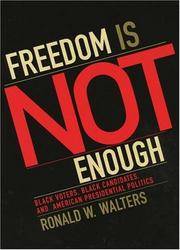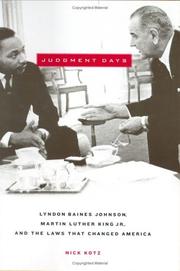| Listing 1 - 10 of 85 | << page >> |
Sort by
|
Book
ISBN: 9780465018468 Year: 2013 Publisher: New York Basic Books
Abstract | Keywords | Export | Availability | Bookmark
 Loading...
Loading...Choose an application
- Reference Manager
- EndNote
- RefWorks (Direct export to RefWorks)

ISBN: 0742538370 9780742548060 Year: 2007 Publisher: Lanham [etc.] Rowman & Littlefield
Abstract | Keywords | Export | Availability | Bookmark
 Loading...
Loading...Choose an application
- Reference Manager
- EndNote
- RefWorks (Direct export to RefWorks)
Book
ISBN: 9780806152004 Year: 2017 Publisher: Norman University of Oklahoma Press
Abstract | Keywords | Export | Availability | Bookmark
 Loading...
Loading...Choose an application
- Reference Manager
- EndNote
- RefWorks (Direct export to RefWorks)
Book
ISBN: 1501763768 Year: 2021 Publisher: Ithaca, NY : Cornell University Press,
Abstract | Keywords | Export | Availability | Bookmark
 Loading...
Loading...Choose an application
- Reference Manager
- EndNote
- RefWorks (Direct export to RefWorks)
The Lawrence and Lynne Brown Democracy Medal, presented by the McCourtney Institute for Democracy at Penn State, recognizes outstanding individuals, groups, and organizations that produce innovations to further democracy in the United States or around the world. Voting is foundational in a democracy, yet over six million American citizens remain stripped of their ability to participate in elections. Once convicted of a felony, people who complete their sentences reenter society, but no longer with the civil rights they once had. They may return to school, secure employment to provide for their families, and become law-abiding, tax-paying citizens-sometimes for decades-and still be denied the voting rights afforded to every other citizen.Desmond Meade, director of the Florida Rights Restoration Coalition and a returning citizen himself, played an instrumental role in the landslide 2018 Amendment 4 victory in Florida, which used the ballot box to restore voting rights to 1.4 million Floridians with a previous felony conviction. Meade argues how, state by state, America can do better. His efforts in Florida present a compelling argument that creating access to democracy for those living on the fringes of society will create a more vibrant and robust democracy for all. He is the winner of the 2021 Brown Democracy Medal for his continuing work to restore voting rights and connect Americans along shared social values.
Political science. --- POLITICAL SCIENCE / Civil Rights. --- voting rights, voting rights in florida, felons and the right to vote, felon voting rights. --- Administration --- Civil government --- Commonwealth, The --- Government --- Political theory --- Political thought --- Politics --- Science, Political --- Social sciences --- State, The
Book
ISBN: 0761865772 0761865764 9780761865773 9780761865766 Year: 2015 Publisher: Lanham, Maryland
Abstract | Keywords | Export | Availability | Bookmark
 Loading...
Loading...Choose an application
- Reference Manager
- EndNote
- RefWorks (Direct export to RefWorks)
This book is a call to investigate the history of federal oversight to secure and preserve black Americans' voting rights over a ninety-five-year interregnum. Holloway confronts this historical conundrum and offers keen observations about voting manipulations and electoral abuse by both government incumbents and private actors.
United States. Voting Rights Act of 1965. --- African Americans --- Voting --- Suffrage --- History --- United States. --- Constitution (United States) --- Voting Rights Act of 1965 (United States) --- 1800 - 1999
Book
Abstract | Keywords | Export | Availability | Bookmark
 Loading...
Loading...Choose an application
- Reference Manager
- EndNote
- RefWorks (Direct export to RefWorks)
Advocacy and Rights --- Legislation and Politics --- Voting rights --- United States Congress. Senate --- United States. Congress. House

Abstract | Keywords | Export | Availability | Bookmark
 Loading...
Loading...Choose an application
- Reference Manager
- EndNote
- RefWorks (Direct export to RefWorks)
Book
ISBN: 1633219941 9781633219946 Year: 2014 Publisher: New York
Abstract | Keywords | Export | Availability | Bookmark
 Loading...
Loading...Choose an application
- Reference Manager
- EndNote
- RefWorks (Direct export to RefWorks)
The Voting Rights Act (VRA) is a landmark federal law enacted in 1965 to remove race-based restrictions on voting. It is perhaps the country's most important voting rights law, with a history that dates to the Civil War. After that conflict ended, a number of constitutional amendments were adopted that addressed the particular circumstances of freed slaves, including the Fifteenth Amendment that guaranteed the right to vote for all U.S. citizens regardless of ""race, color, or previous condition of servitude."" This book provides background information on the historical circumstances that led
Suffrage --- Franchise --- Right to vote --- Voting rights --- Political rights --- Plebiscite --- Representative government and representation --- Voting --- Law and legislation
Book
ISBN: 9788892153684 8892153684 9788892153691 8892153692 9788892103184 Year: 2016 Publisher: Turin G. Giappichelli
Abstract | Keywords | Export | Availability | Bookmark
 Loading...
Loading...Choose an application
- Reference Manager
- EndNote
- RefWorks (Direct export to RefWorks)
Suffrage --- History. --- Franchise --- Right to vote --- Voting rights --- Political rights --- Plebiscite --- Representative government and representation --- Voting --- Law and legislation
Book
Year: 2020 Publisher: Washington U.S. Government Publishing Office
Abstract | Keywords | Export | Availability | Bookmark
 Loading...
Loading...Choose an application
- Reference Manager
- EndNote
- RefWorks (Direct export to RefWorks)
Suffrage --- Voter registration --- African Americans --- Minorities --- Suffrage. --- Suffrage --- United States. --- Voting Rights Act of 1965 (United States) --- United States.
| Listing 1 - 10 of 85 | << page >> |
Sort by
|

 Search
Search Feedback
Feedback About UniCat
About UniCat  Help
Help News
News